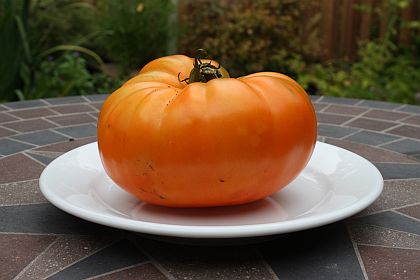As retirements have decimated our Horticulture Department’s faculty ranks, I find myself in the interesting position of teaching a course in small fruit production next fall semester. I’m working on the syllabus as was speak (hence this post). If you’ve read my bio (“About Us”), you’ll see that this is not my bag. But our students are clamoring for fruit and vegetable production courses, so someone’s got to do it. We are also currently without on-campus vegetable faculty, if you can believe it. Though I know a few full professors that could pass as vegetables – HA!!!.
Anyhoo, I volunteered because I know just enough to be dangerous, and am willing to learn more. I’ve been an avid home vegetable gardener
for years. My partner has a Ph.D. in small fruit breeding and genetics, and I helped him with some experiments back in our grad school days (and his field sampling/taste trials made me doubt my specialization in ornamentals). We now have a you-pick blueberry farm where I’m learning the finer points of blueberry culture (the pH thing is a really huge deal). All this vast experience obviously qualifies me to teach fruit production at the college level. I say this tongue-in-cheek, but many Horticulture departments are in the same boat, with early retirements used to meet budget shortfalls, compounded by hiring freezes (since 2007 here). Research staff, grad students, and hired instructors are picking up the teaching load and helping the already-spread-too-thin teaching faculty. I mentioned in a previous post about our brilliant state legislatures’ desire to eliminate urban Extension programs, leaving only the agriculturally–related specialists and offices.
This is depressing on many fronts, but what bothers me most is that I feel we’re missing the boat – just when Horticulture is getting sexy again. Think of how frequently this discipline is mentioned in the media, whether in the form of community gardens, safe food production, the popularity of native plants, sustainability, organics, etc….unfortunately, the writers/broadcasters rarely say the “Horticulture” word. But horticulture is exactly what they’re talking about: small-scale gardening and the art and science thereof. People want to do it, they’re thirsty for good information, and now, with the spotlight on us, we can’t meet their needs.

I can’t really think of an image appropriate to this rambling post, so will end this with a more cheerful photo of one of my tomatoes from last summer (variety is ‘Kellogg’s Breakfast’).
Good luck with the course Holly. I thought you’d been around long enough to know to duck when they ask for volunteers! We’re seeing similar trends around here with increased interest in fruit and veg. production courses after years of decline.
Thank you, Bert! I’m terrible at ducking, unfortunately. Something I didn’t mention is our state’s rapidly-growing wine industry (we’re #9!) and our lack of any coursework or concentration – our one state specialist in at a research station off campus. Our department gets loads of inquiries on this front.
I hope y’all don’t take this post as purposeless fussing; it’s just frustrating, turning students away and simultaneously getting clobbered by administration for not increasing enrollment.
WSU’s administration, in all of its wisdom, eliminated the Hort Department’s major in environmental horticulture. That means that everything they offer now is purely production oriented, except for the LA
degree. They somehow overlook the fact that the majority of people in this state do not farm and actually have gardens and landscapes that need trained people to manage them, to run nurseries, etc. Add to that the fact that UW elminated both botany and horticulture as majors several years ago. I cannot figure out this thinking for the life of me.